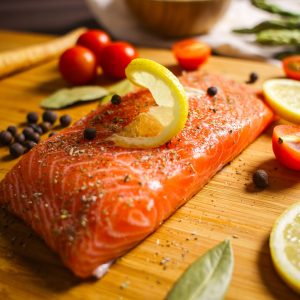
 As spring swings into summer, food events featuring seafood menus pop up around the country. Whether it’s a New England clambake, Southern-style fish fry or crawfish boil, Maine lobster fest or Pacific Northwest salmon tasting, seafood is a beautiful meal to share outdoors. However, despite big strides by local food movements to make ethically raised meat and produce readily available, sourcing sustainable seafood remains a much more complicated endeavor.
As spring swings into summer, food events featuring seafood menus pop up around the country. Whether it’s a New England clambake, Southern-style fish fry or crawfish boil, Maine lobster fest or Pacific Northwest salmon tasting, seafood is a beautiful meal to share outdoors. However, despite big strides by local food movements to make ethically raised meat and produce readily available, sourcing sustainable seafood remains a much more complicated endeavor.
At the turn of the 20th century, seafood (particularly shellfish) was plentiful, affordable and readily available on both coasts. Louisiana’s Gulf Coast powered the Southern economy with its large shrimping and crawfish operations. Since then deregulation, changes in national tastes, industrial pollution and environmental disasters have wreaked havoc on what was the most important source of food and livelihood for coastal communities–and of course, biodiversity in our oceans and lakes.
Seafood is now expensive, hard to trace, and often farm-raised. A lack of packing facilities forces many large fishing operations to send their product to Asia for processing, just to be shipped back to the U.S. in canned or frozen form.
Our national obsession with tuna and salmon sushi rolls have put tremendous pressure on those two species (that should only be eaten from particular waters and in specific seasons), while other perfectly delicious and plentiful fish goes unrecognized and discarded. And because our oceans are bio-diverse ecosystems, the extinction of one species destroys all the life up and down that species’ food chain.
At current rates of over-fishing, scientists predict that most of the world’s seafood supply will collapse by 2048.
We must vote with our forks to bring attention and dollars back to fishermen and communities working against this sweeping tide of sea life degradation. Taking time to properly source seafood for your event will not only improve the taste and quality of your food, it will mediate your environmental impact and attract like-minded attendees.
6 Tips to Sourcing Sustainable Seafood
1. Source seafood caught and processed in the U.S. where species management and safety regulations are stricter and enforced.
2. Look for seafood caught locally and seasonally. All species have abundant times, locations, and seasons when they should not be harvested. Use Seafood Watch or another online resource to figure out what is available where and when.
3. Purchase from fishermen, docks, and distributors that employ reputable practices. Ask locally minded chefs in your community where to find good sources of fish. Don’t be afraid to reach out and ask; they will often be thrilled to bring their suppliers more business.
4. Choose wild-caught seafood over farm-raised. New distribution projects, like Sea 2 Table, bring sustainable, fresh and local seafood directly to the consumer.
5. If possible, choose lesser-known seafood species for your event. Not only will you offer something new and exciting to your attendees, you will help expand your community’s taste for your local waterway’s bio-diversity.
6. Make attendees aware of your sourcing choices. Encourage guests to consider the environmental impact of their eating practices at home. And remember, seafood shells (oyster, clams, mussels) are compostable.
5 Resources for Sustainable Seafood Research:
- Seafood Watch
- Dock to Dish (Northeast)
- Seasonal Cornucopia (Pacific Northwest Seasonality)
- Sea to Table
- Paul Greenberg: American Catch: The Fight for Our Local Seafood
Ready to find your fish? Discover seafood events across the country.
Food & Drink >


 Arts
Arts Comedy
Comedy Event Tips
Event Tips Film
Film Food & Drink
Food & Drink Good Causes
Good Causes Music
Music News
News Radio
Radio Roller Derby
Roller Derby